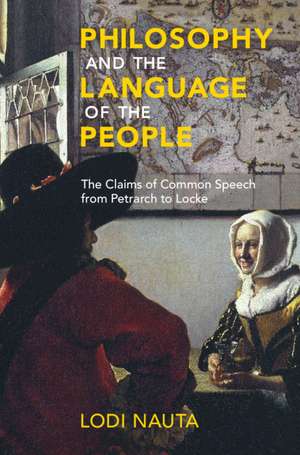Philosophy and the Language of the People: The Claims of Common Speech from Petrarch to Locke
Autor Lodi Nautaen Limba Engleză Hardback – 23 iun 2021
| Toate formatele și edițiile | Preț | Express |
|---|---|---|
| Paperback (1) | 147.15 lei 3-5 săpt. | +14.65 lei 6-12 zile |
| Cambridge University Press – 4 apr 2024 | 147.15 lei 3-5 săpt. | +14.65 lei 6-12 zile |
| Hardback (1) | 308.60 lei 3-5 săpt. | |
| Cambridge University Press – 23 iun 2021 | 308.60 lei 3-5 săpt. |
Preț: 308.60 lei
Nou
Puncte Express: 463
Preț estimativ în valută:
59.05€ • 61.65$ • 48.87£
59.05€ • 61.65$ • 48.87£
Carte disponibilă
Livrare economică 14-28 martie
Preluare comenzi: 021 569.72.76
Specificații
ISBN-13: 9781108845960
ISBN-10: 1108845967
Pagini: 1
Dimensiuni: 160 x 235 x 20 mm
Greutate: 0.5 kg
Editura: Cambridge University Press
Colecția Cambridge University Press
Locul publicării:Cambridge, United Kingdom
ISBN-10: 1108845967
Pagini: 1
Dimensiuni: 160 x 235 x 20 mm
Greutate: 0.5 kg
Editura: Cambridge University Press
Colecția Cambridge University Press
Locul publicării:Cambridge, United Kingdom
Cuprins
Introduction; 1. Early Humanist Critics of Scholastic Language: Francesco Petrarca and Leonardo Bruni; 2. From a Linguistic Point of View: Lorenzo Valla's Critique of Aristotelian-Scholastic Philosophy; 3. Giovanni Pontano on Language, Meaning, and Grammar; 4. Juan Luis Vives on Language, Knowledge, and the Topics; 5. Anti-Essentialism and the Rhetoricization of Knowledge: Mario Nizolio's Humanist Attack on Universals; 6. Skepticism and the Critique of Language in Francisco Sanches; 7. Thomas Hobbes and the Rhetoric of Common Language; 8. Between Private Signification and Common Use: Locke on Ideas, Words, and the Social Dimension of Language; Conclusion.
Recenzii
'Nauta is among the most distinguished historians of philosophy today. His study breaks new ground by concentrating on a vital issue in the early modern rivalry between humanism and scholasticism which still has great resonance in modern academe: the advantages and disadvantages that accrue to philosophy, or any professionalized study, from employing a special technical vocabulary to discuss philosophical problems.' James Hankins, Harvard University
'This book is a great and inspiring tour d'horizon into philosophical reflection on the use of language – and, consequently, on linguistic practice – from the emergence of Renaissance humanism to major thinkers such as Hobbes and Locke. The author invites us into his novel and fascinating story of the genesis of Renaissance and Early Modern (and even contemporary) philosophy.' Jan Papy, Catholic University of Leuven
'This book is a great and inspiring tour d'horizon into philosophical reflection on the use of language – and, consequently, on linguistic practice – from the emergence of Renaissance humanism to major thinkers such as Hobbes and Locke. The author invites us into his novel and fascinating story of the genesis of Renaissance and Early Modern (and even contemporary) philosophy.' Jan Papy, Catholic University of Leuven
Notă biografică
Descriere
A comprehensive examination of the advantages and disadvantages of philosophical jargon, examining its origins in early modern philosophy.
